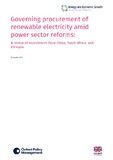| dc.contributor.author | Baker, Lucy | |
| dc.contributor.author | Shen, Wei | |
| dc.contributor.author | Ayele, Seife | |
| dc.coverage.spatial | China | en |
| dc.coverage.spatial | South Africa | en |
| dc.coverage.spatial | Ethiopia | en |
| dc.date.accessioned | 2021-11-30T13:04:55Z | |
| dc.date.available | 2021-11-30T13:04:55Z | |
| dc.date.issued | 2021-11 | |
| dc.identifier.citation | Baker, L.; Shen, W. and Ayele, S. (2021) 'Governing Procurement of Renewable Electricity Amid Power Sector Reforms', Energy and Economic Growth Working Paper, Oxford: Oxford Policy Management | en |
| dc.identifier.uri | https://opendocs.ids.ac.uk/opendocs/handle/20.500.12413/16976 | |
| dc.description.abstract | Renewable energy procurement (REP) is gaining increasing importance globally as a policy instrument in driving energy
diversification and sustainable development agendas, yet little is known about the institutional dynamics of how these policies
evolve and integrate with broader energy sector reform agendas. In this paper, we discuss the institutional changes and
interactions between REP policies and electricity sector reforms in China, South Africa, and Ethiopia. We argue that, for
newly industrialised and developing countries, REP is embedded in the complexity of long-term sectoral reforms to serve
various policy goals such as improving energy access and energy security, enhancing governance efficiency, or attracting private
investment, along with assisting the transition to a modern and sustainable energy system. The introduction of REP into the
prevailing energy system will inevitably impact on existing actor networks, institutional arrangement, and configurations of
power and interest among key public and private entities, particularly when it involves foreign investors and newly established
regulatory entities. Therefore, REP should not be viewed as a mere technical instrument: rather, it has the potential to
destabilise the current political establishment and institutions in perspective countries. To be successful, REP must be
designed to suit the specific historical and institutional context of a country and maintain a considerable level of flexibility to
accommodate potential alternations as sectoral reforms proceed. This forward-looking strategy will inevitably demand strong
state capacity in designing and implementing REP. | en |
| dc.language.iso | en | en |
| dc.publisher | Oxford Policy Management | en |
| dc.rights.uri | https://www.ids.ac.uk/wp-content/uploads/2021/05/Latest_IDSOpenDocs_ExternalDocuments2020.pdf | en |
| dc.subject | Governance | en |
| dc.title | Governing Procurement of Renewable Electricity Amid Power Sector Reforms | en |
| dc.type | Series paper (non-IDS) | en |
| dc.rights.holder | © Applied Research Programme on Energy and Economic Growth | en |
| dc.identifier.externaluri | https://www.energyeconomicgrowth.org/publication/governing-procurement-renewable-electricity-amid-power-sector-reforms | en |
| rioxxterms.funder | Default funder | en |
| rioxxterms.identifier.project | Default project | en |
| rioxxterms.version | VoR | en |
| rioxxterms.funder.project | 9ce4e4dc-26e9-4d78-96e9-15e4dcac0642 | en |

